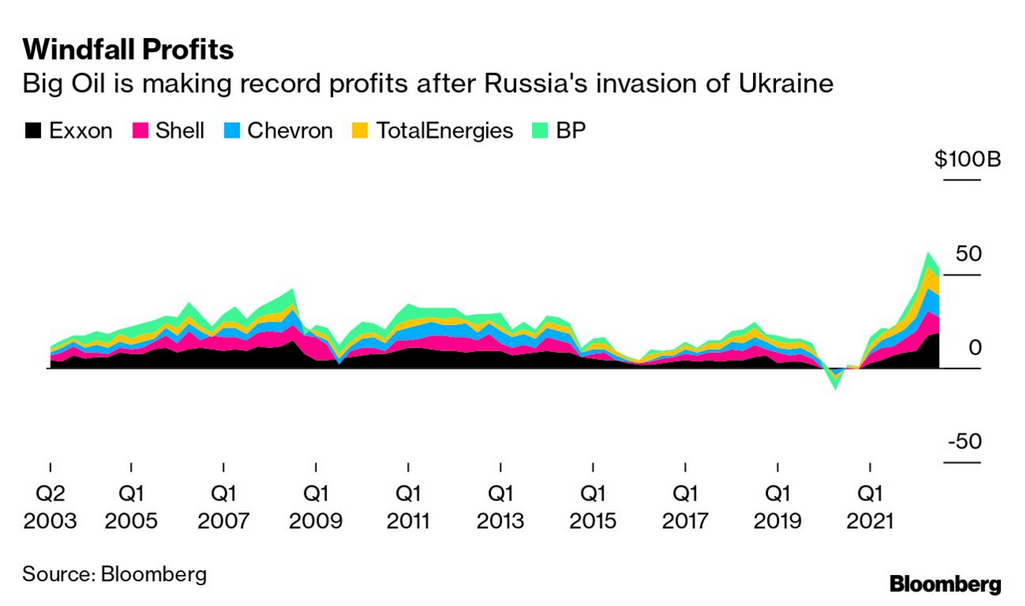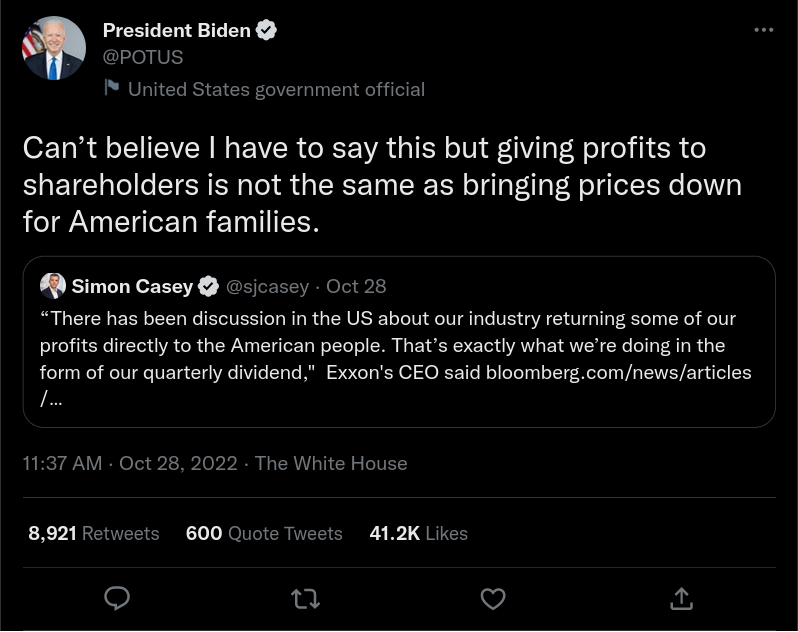November 1, 2022
Oil companies are governments' favourite frenemies
Oil company profits are exceedingly high. Always. But, we tend to only notice when the economy is doing poorly.
Profits for these companies are particularly high right now looking at unadjusted net profits:

Biden calls this "profiteering" and has promised a special "tax" if the companies do not invest in more production.
This is all backwards, of course. Oil companies sell a product at a market price. They (and the states that own/regulate those companies) manipulate that market, for sure, but it the issue is that even if they did not they would still make bumper profits.
This is another example of the Democrats in the USA saying that they are mad at the market system that they individually profit from.
The White House even pretended that they are not implicated in this fantasy:

Dividends are not the same as bringing prices down. Of course, that's the point of capital: to transfer wealth from the non-owners group to the owners of capital.
The other side is also true. If the government taxes the companies now (after they have distributed profits to shareholders), all it does is reduce investment.
The only solution here was either to establish a capital gains tax, taxing the company, regulating the price of oil, and investing in energy production (let's include green energy).
Of course, that is basically nationalization.
The fantasy is that the Democrats in the White House do not know this.
Bargaining in Canada
The workers' bargaining process in Canada is at a punctuation point. The slow degrading of workers' bargaining rights has been happening under the noses of leadership of unions for decades, but it is now quite impossible for members to continue to ignore that this is not working.
Unionized workers' wages are not growing at all and it is obvious to everyone.
The blunt instrument of the use of a Dictatorship Decree by the Government of Ontario to impose conditions on the OSBCU is the latest in what should have been a long line of "Red Lines".
So, what will come of this? It is unclear to me, but it is an opportunity.
Support workers in school boards in Ontario are underpaid and under-appreciated and they know it. Almost uniformly.
There has been a lot of work done to organize this section of the union by labour militants. They have developed structures of resistance and mobilization during this round of bargaining rather unseen in most of the labour movement in Canada.
Unfortunately, they have reached a wall that exists—but is usually not reached—for all workers in this economy: the full blunt uncaring power of the state to squash workers' demands for fair wages.
Many private sector workers think that this is a "public sector union" issue. It is not. The Ontario Government is not the direct employer here. That employment has been contracted-out to School Boards, much like most "public" employment in Canada.
The state is trying (and mostly getting) it both ways: decentralized blame for cuts to school budgets, but also a centralized ability to undermine the system as a whole during bargaining.
We pretend that this is just the Tories. But, the Liberals are at the same game. The Liberals were trying to find the perfect wording for legislation to be able to impose contract conditions on workers without overstepping the constitution. The Tories, it is clear, do not care about constitutional limits on government power and are determined to let people know. But, both parties have the same goal: to limit the rights of workers so that capital can keep their profits.
There are two solutions here:
- a different government who has a different goal.
- an empowered class that take action to defend its rights and tries to win-back some gains.
They both require the same thing.
This is an opportunity. But, like all opportunities, we have a choice. We either take it or we wait for the next one. We will see where we land.